What Cream Is Best For Tattoos? Choosing the right cream is crucial for proper tattoo aftercare, ensuring vibrant and long-lasting ink. At tattooat.com, we understand the importance of protecting your investment, so we’ve compiled expert recommendations and essential shopping advice to help you select the ideal tattoo cream for optimal healing and maintenance. From hypoallergenic formulas to organic options, discover the best tattoo healing lotion for your skin and artwork, all while exploring the diverse world of tattoo designs and artists on tattooat.com.
1. Understanding Tattoo Aftercare
After getting a tattoo, the aftercare process is just as important as the initial procedure. Proper aftercare not only prevents infection but also maximizes the vibrancy and longevity of your new ink. According to Lina Shuliar, a New York-based tattoo artist, the client bears full responsibility for their skin after the session. Shuliar emphasizes that a fresh tattoo is an open wound that needs to be cleaned, moisturized, and protected from the environment.
1.1 The Importance of Proper Moisturizing
Moisturizing is a crucial step in tattoo aftercare. It helps keep the skin hydrated, promotes healing, and prevents the tattoo from drying out and cracking. Dryness can lead to scabbing, which can pull out ink and affect the tattoo’s appearance. A good moisturizer will create a protective barrier on the skin, allowing it to heal properly.
1.2 Key Elements of Tattoo Aftercare
Here are the key components of tattoo aftercare:
- Cleaning: Gently clean the tattoo with antimicrobial, unscented soap and water to prevent infection.
- Moisturizing: Apply a thin layer of tattoo cream to keep the skin hydrated and promote healing.
- Protection: Protect the tattoo from the sun, dirt, and other irritants.
- Bandaging: Use adhesive films or dry pads to keep the tattoo clean and dry, especially during the initial healing phase.
2. What to Look For in a Tattoo Cream
Choosing the right tattoo cream can be overwhelming with so many products available. Understanding what to look for will help you make an informed decision. According to experts, hypoallergenic formulas are the best options because they prevent irritation. Here are some essential criteria to consider.
2.1 Hypoallergenic and Fragrance-Free Formulas
The best tattoo creams are hypoallergenic and fragrance-free. Fragrances and other additives can irritate the skin and cause allergic reactions, which can hinder the healing process. A hypoallergenic formula minimizes the risk of irritation.
2.2 Key Ingredients to Look For
Certain ingredients can significantly aid in tattoo healing and maintenance:
- Shea Butter: Known for its moisturizing and anti-inflammatory properties.
- Vitamin E: Helps to heal wounds and keep the skin hydrated.
- Cocoa Butter: Forms a protective barrier on the skin and keeps it moisturized.
- Panthenol (Vitamin B5): Used for wound healing and skin regeneration.
- Coconut Oil: Provides moisture and has antimicrobial properties.
- Tallow: Natural animal fat that’s healing and hydrating.
2.3 Ingredients to Avoid
It’s equally important to know what ingredients to avoid. According to dermatologist Paul, you should avoid fragrances, alcohol, bacitracin, neomycin, and polysporin. These can be too harsh for new tattoos and may cause irritation or allergic reactions.
- Fragrances: Can cause allergic reactions and irritate sensitive skin.
- Alcohol: Dries out the skin and can delay healing.
- Bacitracin, Neomycin, and Polysporin: Antibiotics that may be too harsh for new tattoos.
2.4 The Significance of Consistency
Moisturizers come in various consistencies, including lotions, balms, and ointments. Clients know their bodies best, so they should choose whatever type of moisturizer will best suit their skin.
3. Best Tattoo Creams of 2024: Expert Recommendations
To help you navigate the vast array of tattoo creams, here are some top recommendations from tattoo artists and dermatologists, ensuring your ink stays vibrant and your skin stays healthy. These products have been selected based on their ingredients, effectiveness, and customer reviews.
3.1 Aquaphor Healing Ointment
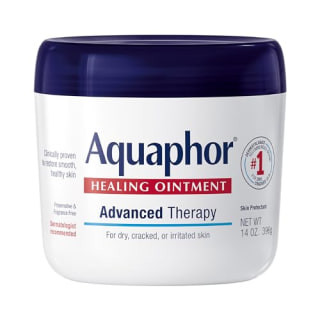 Aquaphor Healing Ointment
Aquaphor Healing Ointment
Both Paul and Shuliar recommend Aquaphor healing ointment for tattoo aftercare because it’s unscented and designed to create a protective healing barrier while allowing oxygen to pass through. It’s also dermatologist-tested and can be used on minor wounds or irritations.
- Pros:
- Dermatologist-tested
- Unscented
- Versatile
- Cons:
- Contains petroleum
3.2 Cerave Healing Ointment
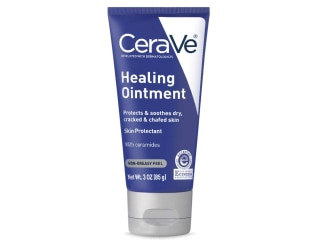 Cerave Healing Ointment
Cerave Healing Ointment
Paul also recommends Cerave healing ointment, which is hypoallergenic and free from fragrances, dyes, and preservatives. The hyaluronic acid helps the skin retain hydration, while the petroleum locks in moisture to promote healing, and the ceramides restore the skin’s natural protective barrier.
- Pros:
- Hypoallergenic
- Fragrance-free
- Contains ceramides
- Cons:
- Contains petroleum
3.3 Hustle Butter Tattoo Aftercare Balm
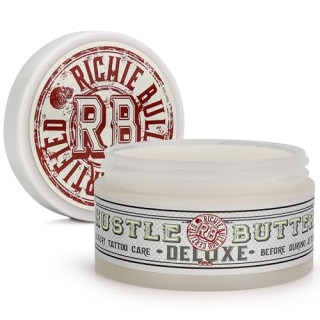 Hustle Butter Tattoo Aftercare Balm
Hustle Butter Tattoo Aftercare Balm
This petroleum-free option suits experts’ criteria. It has recommended ingredients such as shea butter, coconut oil, and vitamin E in its formula. It also has an average 4.7-star rating from over 30,000 Amazon reviewers.
- Pros:
- Petroleum-free
- Cruelty-free
- Cons:
- Pricey
3.4 Tattoo Goo Tattoo Balm
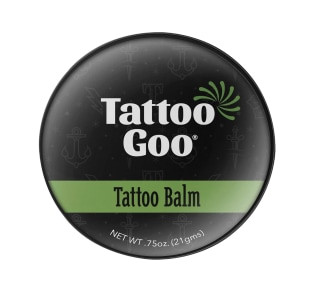 Tattoo Goo Tattoo Balm
Tattoo Goo Tattoo Balm
This balm contains vitamin E, cocoa butter, olive oil, and herb extracts, which keep tattoos hydrated and help to maintain their vibrancy over time. It’s also dermatologist-tested.
- Pros:
- Dermatologist-tested
- Preserves vibrancy
- Travel-friendly
- Cons:
- Not unscented
3.5 Amikole’s Shea Butter Lavender
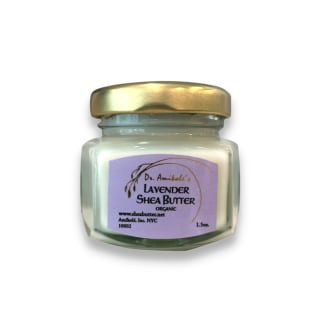 Amikole
Amikole
Shuliar, who prefers organic skin care products made with just a few clean ingredients, recommends this shea butter with hemp and lavender oils in it because it “has simple ingredients, smells amazing, and has great healing effects.”
- Pros:
- Simple ingredients
- Organic
- Cons:
- Lavender scented
3.6 Dusty Swamp Provisions Bear Grease
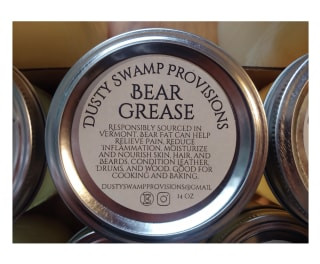 Dusty Swamp Provisions Bear Grease
Dusty Swamp Provisions Bear Grease
Dillon Forte, a tattoo artist and the owner at Forte Tattoo in Austin, Texas, recommends tallow (or animal fat) as a great moisturizer because it’s natural, healing, and hydrating. This Dusty Swamp Provisions Bear Grease is handmade from 100% bear tallow that is sourced from local hunters who would otherwise throw the fat away.
- Pros:
- Has natural bear tallow
- Responsibly sourced
- Cons:
- Not vegan
4. Additional Aftercare Products
In addition to choosing the right tattoo cream, other aftercare products are essential for proper healing. Keeping your new tattoo moisturized is only half the battle; you also need to keep it clean, covered, dry, and protected from the sun.
4.1 Antimicrobial Soaps
Cleaning your tattoo with antimicrobial soap and water keeps the site safe from bacteria, viruses, dirt, and dust. To avoid irritation, use unscented, hydrating soaps without harsh ingredients that may strip the skin of its moisture.
4.1.1 Dove Beauty Bar Sensitive Skin Soap
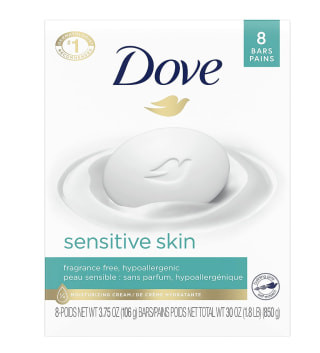 Dove Beauty Bar Sensitive Skin Soap
Dove Beauty Bar Sensitive Skin Soap
Any soap that’s antimicrobial, unscented, and gentle will do the trick. These Dove bars have a 4.8-star rating from 55,000 reviewers, many of whom use them to clean tattoos.
- Pros:
- Hypoallergenic
- Fragrance-free
- Designed for sensitive skin
- Cons:
- None noted
4.1.2 SecondSkin Foaming Tattoo Wash
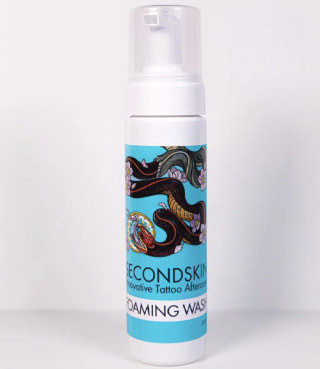 SecondSkin Foaming Tattoo Wash
SecondSkin Foaming Tattoo Wash
Shuliar names SecondSkin as a good brand for tattoo aftercare. It’s fragrance-free, alcohol-free, and made from primarily natural ingredients such as coconut, olive, and almond oil.
- Pros:
- Fragrance-free
- Antimicrobial
- pH-balanced
- Cons:
- Pricey
4.1.3 Tattoo Goo Deep Cleansing Soap
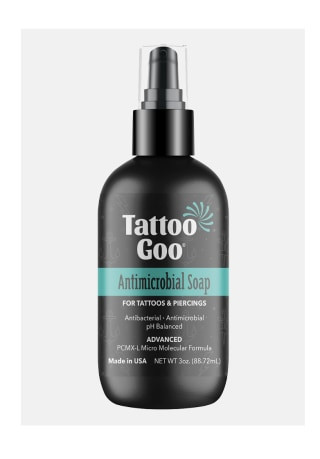 Tattoo Goo Deep Cleansing Soap
Tattoo Goo Deep Cleansing Soap
This cleansing soap is specifically designed for tattoos and piercings. It’s fragrance-free, alcohol-free, and antimicrobial for sensitive skin.
- Pros:
- pH-balanced
- Antimicrobial
- Also cleans piercings
- Cons:
- Some say it has a smell
4.2 Bandages and Protective Films
Bandages and adhesive films play a crucial role in protecting your new tattoo from bacteria, abrasion, and scarring. They also help to keep the area clean and dry during the initial healing phase.
4.2.1 Recovery Armor Derm Shield
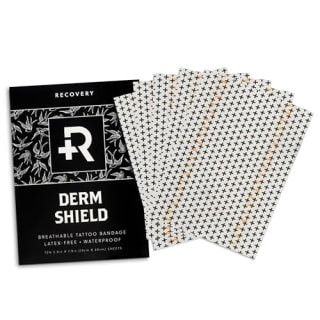 Recovery Armor Derm Shield
Recovery Armor Derm Shield
Often worn for a few days to keep a new tattoo clean and dry, these adhesive films are good for people who do not have any allergies. These tattoo bandages are waterproof and durable to prevent bacteria, abrasion, and scarring, yet still breathable, flexible, and transparent for comfortable wear.
- Pros:
- Transparent
- Waterproof
- Breathable
- Cons:
- Some dislike the adhesive
4.2.2 Rescue Essentials 3M Tegaderm Transparent Film Dressing
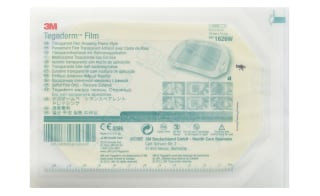 Rescue Essentials 3M Tegaderm Transparent Film Dressing
Rescue Essentials 3M Tegaderm Transparent Film Dressing
This sterile, transparent film is microporous so sweat doesn’t get trapped but still helps to keep the site dry. The adhesive frame makes for easy application.
- Pros:
- Sterile
- Transparent
- Microporous
- Cons:
- None noted
4.2.3 Tattoo Armour Medium Sheets
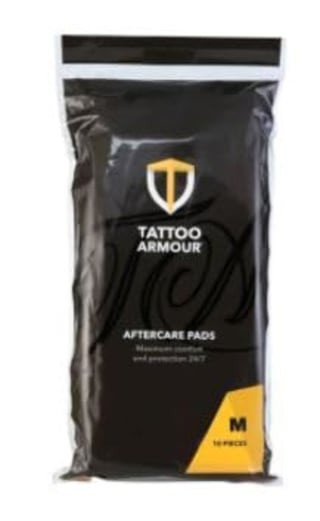 Tattoo Armour Medium Sheets
Tattoo Armour Medium Sheets
Dry pads are the best solution for those who have sensitive skin or allergies. The sterile pads are made from soft, absorbent material that soaks up any surplus fluids to keep the area dry and protected.
- Pros:
- Great for sensitive skin
- Sterile
- Absorbent
- Cons:
- Not waterproof
4.3 Sunscreens for Tattoo Protection
Protecting your tattoo from the sun is essential for maintaining its vibrancy and preventing fading. Sunscreen should not be applied on a brand-new tattoo, as it may irritate the micro-injuries in the skin. However, after two to three weeks, sunscreen becomes a major part of the healing process. Zinc oxide-based sunscreens provide the best gentle protection against damage and fading.
4.3.1 Native Mineral Sunscreen
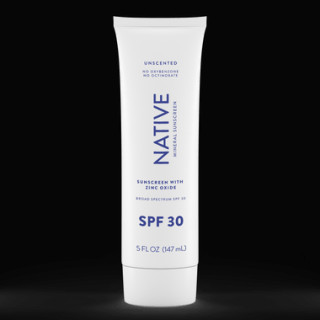 Native Mineral Sunscreen
Native Mineral Sunscreen
Once the tattoo is healed, Shuliar recommends her favorite sunscreen from Native. It’s mineral-based, unscented, and provides SPF 30 protection via zinc oxide.
- Pros:
- Mineral-based
- Unscented
- Dermatologist-tested
- Cons:
- May leave a white cast
4.3.2 Blue Lizard Sensitive Mineral Sunscreen Stick
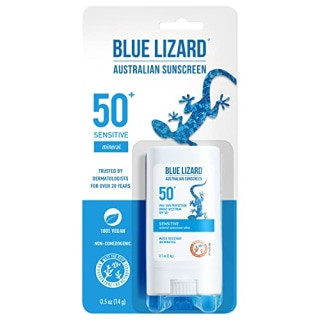 Blue Lizard Sensitive Mineral Sunscreen Stick
Blue Lizard Sensitive Mineral Sunscreen Stick
This sunscreen stick is a favorite among those with tattoos because it’s fragrance-free and easy to apply. It’s also mineral-based and designed for sensitive skin.
- Pros:
- Easy to apply
- Fragrance-free
- Water-resistant
- Cons:
- Sticky texture
4.3.3 Sun Patch Hand and Cheek UPF 50 Patches
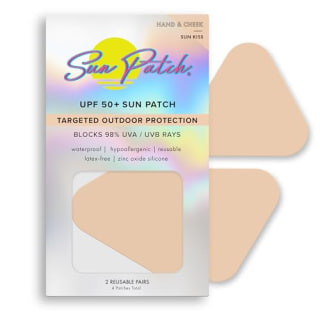 Sun Patch Hand and Cheek UPF 50 Patches
Sun Patch Hand and Cheek UPF 50 Patches
These patches cover your tattoos with UPF-50 protection. They’re reusable, easy to apply, and safe for sensitive skin.
- Pros:
- Great for sensitive skin
- Sterile
- Absorbent
- Cons:
- Not waterproof
5. How to Moisturize a New Tattoo: A Step-by-Step Guide
Knowing how often to moisturize your new tattoo is critical for its proper healing. Before you apply any aftercare product, make sure your tattoo is dried up. After that, you should apply a moisturizing product two to three times a day and continue this routine typically anywhere from 10 days to 4 weeks.
5.1 Detailed Moisturizing Steps
- Wash Your Hands: Before touching your tattoo, wash your hands thoroughly with antimicrobial soap and water to prevent infection.
- Gently Clean the Tattoo: Use a mild, unscented soap to gently clean the tattoo. Rinse with lukewarm water and pat dry with a clean paper towel.
- Apply a Thin Layer of Tattoo Cream: Apply a small amount of tattoo cream to the tattoo. Use a thin layer to allow the skin to breathe.
- Gently Rub It In: Gently rub the cream into the skin using circular motions. Avoid applying too much pressure.
- Repeat as Needed: Repeat this process two to three times a day, or as needed to keep the skin hydrated.
5.2 How Often Should You Moisturize?
Moisturize your new tattoo two to three times a day for about 10 days to 4 weeks.
6. Addressing Common Concerns and FAQs
Navigating tattoo aftercare can bring up many questions. Here are some frequently asked questions to help you better understand the process and address common concerns.
6.1 Is Redness and Oozing Normal After Getting a Tattoo?
“After you’ve just gotten inked, it’s totally normal to feel some redness, itchiness, and tenderness around the tattoo. You might even see some extra ink, blood, or fluid oozing out of your skin for a few days,” says Forte. If you keep your tattoo dry and clean inside its initial bandage, it should clear up within a few days, after which you can begin applying products to encourage healing. If your tattoo isn’t healing properly, see your doctor.
6.2 Can I Swim After Getting a Tattoo?
“Be sure to give it a day or two before getting the tattoo wet (if possible) and avoid swimming for a week or two,” says Forte. Until the tattoo fully heals, Shuliar also recommends avoiding baths, saunas, and excessive steam, which may cause smaller details to fade or blur.
6.3 How Does Sun Exposure Affect a New Tattoo?
When you have a fresh tattoo, exposure to sunlight can damage the skin and fade the ink, so you should keep the site covered or stay out of the sun entirely for a few weeks. Once the area is healed, you should apply sunscreen over the tattoo whenever you’re outside, but especially in the summer or while on vacation.
6.4 Can I Use Regular Lotion on My Tattoo?
While regular lotion can provide moisture, it may contain fragrances and other additives that can irritate a new tattoo. It’s best to use a tattoo-specific cream or a hypoallergenic, fragrance-free lotion.
6.5 What If My Tattoo Is Itchy?
Itchiness is a common symptom of healing. Avoid scratching the tattoo, as this can damage the skin and affect the tattoo’s appearance. Instead, apply a thin layer of tattoo cream to relieve the itch.
6.6 How Long Does It Take for a Tattoo to Heal?
The healing time for a tattoo can vary depending on the size, location, and your body’s healing ability. Generally, it takes about 2 to 4 weeks for the outer layer of skin to heal and several months for the deeper layers to fully recover.
6.7 What Are the Signs of a Tattoo Infection?
Signs of a tattoo infection include:
- Excessive redness and swelling
- Pus or drainage
- Fever
- Increased pain
- Red streaks radiating from the tattoo
If you experience any of these symptoms, seek medical attention immediately.
6.8 Can I Use Vaseline on My Tattoo?
While Vaseline can provide a protective barrier, it is not recommended for new tattoos. Vaseline is petroleum-based and can trap moisture, which can lead to infection.
6.9 Is It Normal for a Tattoo to Peel?
Yes, it’s normal for a tattoo to peel during the healing process. This is a sign that the skin is regenerating. Avoid picking at the peeling skin, as this can damage the tattoo.
6.10 Can I Exercise After Getting a Tattoo?
Avoid strenuous exercise for the first few days after getting a tattoo. Sweat can irritate the tattoo and increase the risk of infection. When you do exercise, wear loose-fitting clothing and clean the tattoo immediately afterward.
7. Finding Inspiration and Expertise at Tattooat.com
At tattooat.com, we understand the passion and dedication that goes into tattoo art. Whether you’re a seasoned collector or considering your first piece, our platform offers a wealth of resources to guide you.
7.1 Discover Unique Designs
Explore our extensive library of tattoo designs, curated to inspire your next masterpiece. From traditional motifs to avant-garde creations, find the perfect design that resonates with your personal style.
7.2 Connect With Talented Artists
Browse our directory of skilled tattoo artists across the United States, including those in Portland and other cities with thriving tattoo cultures. Find an artist whose style aligns with your vision and book a consultation to discuss your ideas.
7.3 Expert Knowledge and Guidance
Access our comprehensive articles and guides on tattoo aftercare, styles, history, and more. Learn from industry experts and gain the knowledge you need to make informed decisions about your tattoo journey.
8. Conclusion: The Art of Tattoo Aftercare
Choosing the best cream for your tattoo is an essential part of the aftercare process. By selecting the right products and following a consistent moisturizing routine, you can ensure your tattoo heals properly and remains vibrant for years to come. Remember to prioritize hypoallergenic, fragrance-free formulas with beneficial ingredients like shea butter, vitamin E, and coconut oil.
At tattooat.com, we are dedicated to providing you with the resources and inspiration you need to make your tattoo experience exceptional. Explore our designs, connect with talented artists, and dive into our expert guides to elevate your tattoo journey.
Ready to take the next step? Visit tattooat.com today to discover stunning designs, find your dream artist, and learn everything you need to know about tattoo art and aftercare. Explore the art of self-expression with tattooat.com. Your perfect tattoo awaits.
Address: 1825 SW Broadway, Portland, OR 97201, United States
Phone: +1 (503) 725-3000
Website: tattooat.com
Let tattooat.com be your ultimate guide to the world of tattoos.
